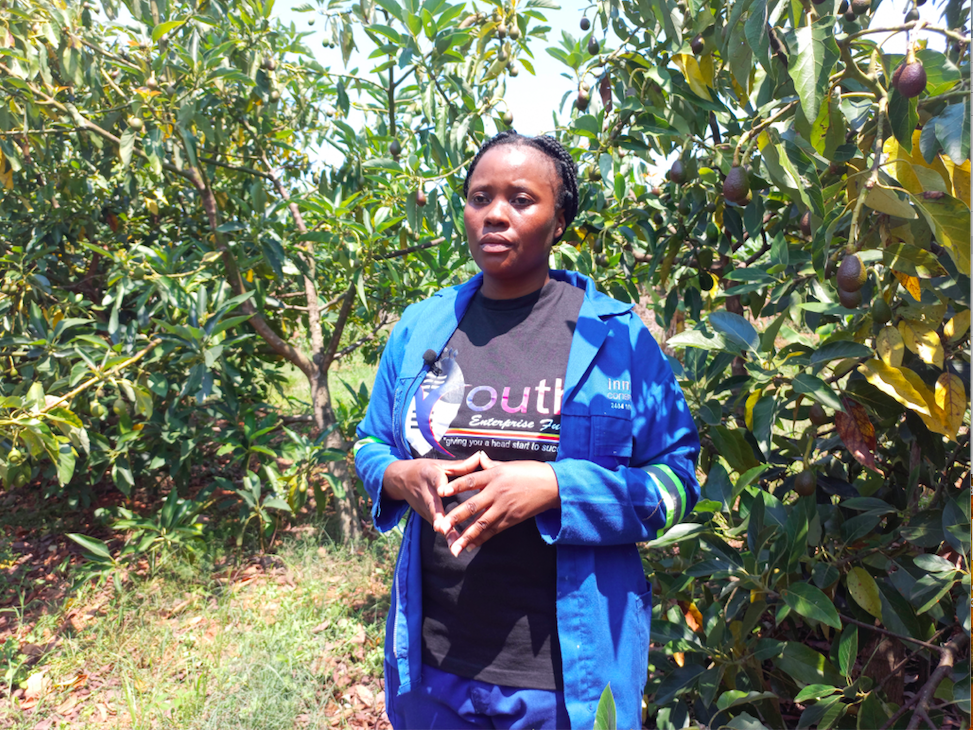By Nonduduzo Kunene
When Fezile Hlophe fell pregnant and dropped out of school, her immediate plans had to be put on hold – but her dream of being a successful businesswoman was not.
At only 17 years old, Hlophe had to find a way to provide for her child as a single parent, so she started braiding people’s hair in her neighbourhood.
“I didn’t earn much, but I had aspirations of being a better person one day,” she said.
Several years later, when Hlophe went to braid the hair of a new customer located around 20 kilometres from where the young woman lived, she was struck by a revelation.
“When I entered the homestead of the new customer I walked into ten avocado trees that had avocados growing on them,” Hlophe shared.
“As I was braiding the new customer, we ended up talking about growing fruit trees and how avocados had a market,” she added.
Mesmerised by the avocado trees she saw at her customer’s house and their shared conversation, Hlophe started to learn more about avocado farming.
“I took the money I was paid by my customers and bought avocado seedlings, which I grew in my yard,” she said.
Much to her shock – as she had not anticipated that they would grow healthily and produce a good yield – the trees soon started producing fruit.
Before her life-changing conversation, Hlophe had met and married a qualified teacher and through
their marriage, she became a landowner.
“After getting married, my mother-in-law called me and my husband and showed us these four hectares of land. At the time she showed us the land, it was just a forest between mountains,” she said.
At first, Hlophe found it unbelievable that her mother-in-law had decided to give her land.
Knowing the challenges faced by women when it came to ownership of land in Eswatini, Hlophe made sure that no one would fight her about her ownership in the future. She acquired written agreements to ensure that the land would remain hers and that no one had a problem – including the traditional authorities.
“I remember my husband laughing and asking me what I was thinking of the land that his mother allocated to us. At the time, I was as clueless as him, but I told him that maybe we will use it for farming over the years. We slowly cleared it and started farming maize for our own consumption,” she said.
Hlophe took the money she earned from selling the maize and bought around 70 avocado trees, planting them on either side of the land. They, too, grew and produced a good yield.
Soon after, the radio brought some good news to the budding farmer. The news came in the form of an announcement through national radio about Youth Enterprise Revolving Fund loans, a government initiative providing seed capital to young people who want to start businesses.
“I was keen on the announcement and did my research, which resulted in me applying for the loan. I did not qualify for the loan at first, but I did not lose focus. Instead, I asked why. I was told that I didn’t qualify because the money I had requested was beyond the stipulated amount,” she revealed.
The fund offers loans up to 100,000 emalangeni (about US$5,900) depending on the nature of the business.
Hlophe successfully negotiated to reduce the loan application. The loan was approved for US$2,941. She used the loan to buy 350 trees and planted them in 2022. These trees have since started growing avocados as well.
In total, Hlophe now has over 420 avocado trees, with 70 of those being harvested. Showcasing her produce at the Eswatini International Trade Fair, she earned regional and continental recognition.
Hlophe also has over 1,000 banana trees and is even being popularly touted as a ‘self-made fruit farmer’.
She is now looking to diversify her potential market to include exports (she has the choice of exporting individually or through the country’s National Agricultural Marketing Board) and has started looking for more land.
“Through the continental channels I have unlocked, I am looking forward to exporting the avocadoes and other fruits I want to grow,” she disclosed.
Neighbouring South Africa is already the continent’s third-largest avocado exporter, after Kenya and Ethiopia, with South Africa’s various fruit exports worth over US$3 billion per annum. But Hlope’s is already looking further ahead.
“My journey does not end with selling fruits, but I am also looking into processing. During the summer, we experience a lot of rain that makes the area inaccessible. Imagine being stuck with ripe fruits during the harvesting season due to slippery gravel roads. It is for that reason I am looking into processing after I have built a packhouse,” she said.
Through her business, she can repay her monthly instalment of 1,600 lilangeni (US$88) towards the Youth Fund loan and sustain her basic needs. She expects to repay the loan in full within three years.
Director of Agricultural and Extension Services in the Ministry of Agriculture Nelson Mavuso said Hlophe was an example of entrepreneurial potential in the country’s agrifoods sector.
“Most of emaSwati are slowly discovering commercial farming, and most of them are in vegetable and animal farming. Commercial fruit farming is mostly practised by companies. It is impressive to see a young person having such passion,” he added.
The director noted that he had engaged with Hlophe and he was impressed by her vision.
In October 2023, Hlope won the Southern Africa Development Community (SADC) Rural Innovator competition at the SADC Rural Farmers Women Expo, held in Kinshasa.
“I am grateful for this award and attribute my success to God, my loving husband, family and the Youth Fund for all the support they have given me,” she said.
bird story agency






